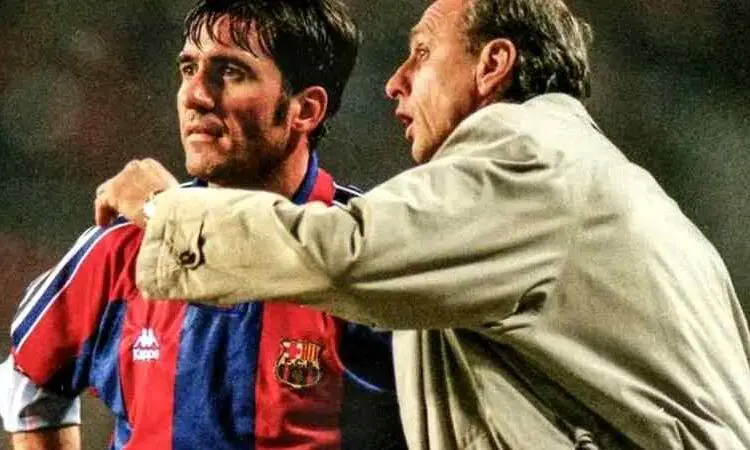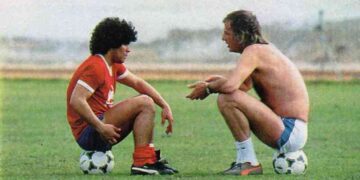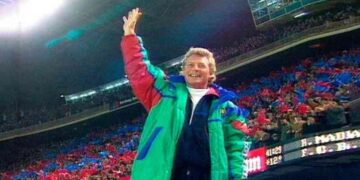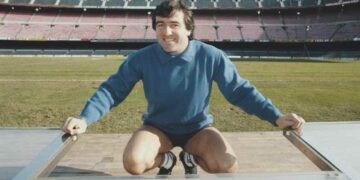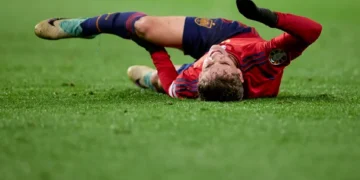In the annals of football history, there are names that shine brighter than the rest, and among them, Gheorghe Hagi’s is a beacon of brilliance. Known as “The Maradona of the Carpathians,” Hagi left an indelible mark on the sport and, notably, at FC Barcelona. This article delves into the captivating journey of one of football’s most iconic figures, exploring Hagi’s unforgettable legacy and his remarkable impact during his time with the Catalan giants.
Early Days of Hagi: A Romanian Prodigy Emerges
Gheorghe Hagi, the footballing sensation later hailed as “The Maradona of the Carpathians,” embarked on his remarkable journey from the heart of Romania. Born in the picturesque city of Săcele on February 5, 1965, Hagi’s destiny as a footballing legend began to take shape at an early age.
From the very start, young Gheorghe displayed an extraordinary talent for the beautiful game. His innate ability to control the ball with grace, navigate the field with precision, and unleash thunderous shots from remarkable distances caught the attention of many. In the tightly-knit football community of Romania, whispers about a prodigious talent started to circulate.
Hagi’s journey into the professional ranks commenced with FC Farul Constanța in 1982, where he debuted as a 17-year-old. His electrifying presence on the pitch soon became a talking point. At Farul, he honed the skills that would one day mesmerize the footballing world. His nimble footwork and eye-catching dribbling abilities set him apart from the rest, and it was evident that he was destined for greatness.
However, it was his extraordinary vision that truly defined Hagi’s early career. The young Romanian possessed an uncanny ability to read the game, seeing passes that no one else could. Whether it was a pinpoint cross, a threaded through ball, or a rocket from outside the box, Hagi’s vision was nothing short of mesmerizing. He could orchestrate play with an elegance that was a joy to behold.
The Arrival at Camp Nou: Gheorghe Hagi Lights Up Barcelona
Hagi’s talents transcended borders, and soon, he found himself in the white jersey of Real Madrid, one of the world’s most prestigious clubs. His stint in Spain’s capital showcased his ability to adapt to different footballing cultures and leagues. Although his time at Real Madrid was relatively short, Hagi’s influence on the pitch was profound.
From there, Hagi embarked on another adventure, this time in Italy with Brescia. Serie A was known for its tactical prowess and defensive solidity, but Hagi’s magic couldn’t be contained. His performances at Brescia further solidified his status as one of the game’s most gifted playmakers.
The context was set for Hagi’s arrival at Barcelona. The club was eager to capture the magic of Hagi’s playmaking abilities. His signing was seen as the missing piece in the puzzle. Barcelona fans envisioned a beautiful partnership between Hagi and the likes of Romário and Stoichkov, where footballing poetry would be written on the lush green canvas of Camp Nou.
The anticipation reached a fever pitch as fans eagerly awaited Hagi’s debut in the iconic Blaugrana jersey. The Camp Nou faithful knew that they were about to witness something extraordinary – a player who could make the ball dance to his tune, a maestro who could turn a mundane match into a spectacle of artistry.
Gheorghe Hagi, the Romanian sensation, had arrived at Camp Nou, and the footballing world watched in awe as the Maradona of the Carpathians embarked on a journey that would forever etch his name in the annals of FC Barcelona’s storied history.
Initial Impressions
The moment had finally arrived. Barcelona fans held their breath in anticipation as Gheorghe Hagi, “The Maradona of the Carpathians,” made his debut in the iconic Blaugrana jersey. It was a momentous occasion, one that would be etched in the memories of those fortunate enough to witness it.
Critics had speculated whether Hagi’s playing style would mesh with Barcelona’s famed ‘Total Football.’ The doubts were swiftly dispelled. Hagi’s ability to read the game, find pockets of space, and deliver inch-perfect passes complemented Barcelona’s philosophy seamlessly. He wasn’t just a playmaker; he was the conductor of a footballing symphony.
Fans, who had anxiously awaited his arrival, erupted in joy. The Camp Nou became a cauldron of celebration, a place where dreams took flight. Hagi had instantly won over the hearts of Barcelona faithful, and they embraced him as one of their own.
Hagi’s Departure
As the mid-’90s approached, the landscape at FC Barcelona began to change. Johan Cruyff’s ‘dream team’, which had dazzled football fans with its style of play, was entering its twilight. And unfortunately for Gheorghe Hagi, this shift in dynamics had consequences for his time at the club.
Hagi’s stint at Barcelona was relatively brief, spanning from 1994 to 1996. In that time, he made just 36 appearances for the club. While his technical brilliance was undeniable, he found himself in a team transitioning into a new era. The club’s focus was shifting, and younger talents were emerging.
Regrettably, Hagi’s departure from Barcelona left behind a sense of unfinished business. He had showcased moments of sheer brilliance during his time at Camp Nou, but the circumstances surrounding his exit meant that fans were left yearning for more. There was a feeling that Hagi’s time at the club had been cut short, leaving behind the lingering question of what could have been if he had stayed longer.
Life After Barcelona: From Player to Coach
Following his time at Barcelona, Gheorghe Hagi embarked on a new chapter in his footballing journey, one that would see him leave an enduring legacy both on and off the pitch. However, before diving into the coaching realm, let’s first explore his remarkable exploits as a player. Including his pivotal role at Galatasaray.
After leaving Barcelona, Hagi found a new home at Galatasaray. The Turkish club that was on the cusp of making a name for itself on the European stage. His arrival marked a turning point for the Turkish club. With his exceptional skills and footballing vision, Hagi played a vital role in catapulting Galatasaray to prominence. He became the linchpin of their midfield, orchestrating plays with finesse and contributing crucial goals.
However, as the years rolled on, Gheorghe Hagi realized that his playing days were drawing to a close. In 2001, he decided to hang up his boots. Thus concluding a magnificent career that had seen him grace some of the finest clubs in Europe, leaving fans in awe of his unparalleled skills.
It was only after retiring from football that Hagi transitioned into the world of coaching. His profound understanding of the game, honed over decades as a player, now found a new outlet. He was ready to impart his wisdom and passion for football to the next generation of players. And so began a coaching journey that would make a significant impact on the sport he had dedicated his life to.
Gheorghe Hagi’s transition from player to coach was a natural progression. A testament to his unwavering love for the beautiful game. It marked the beginning of a new adventure, one in which he would continue to influence and shape football, leaving an indelible mark on the sport that had been his lifelong passion.
Discover more from Barça Buzz
Subscribe to get the latest posts sent to your email.

